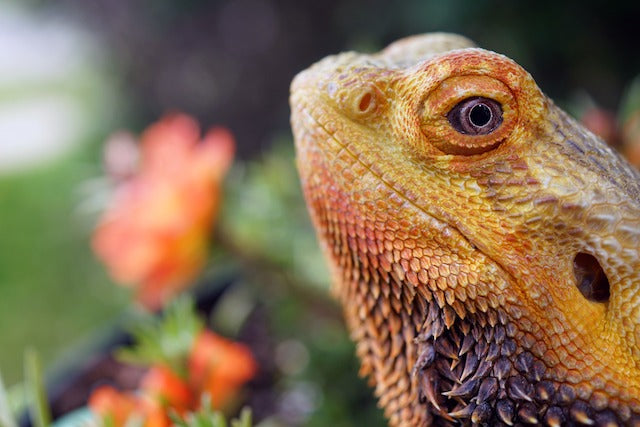If your bearded dragon is experiencing stress, you may notice any of the following symptoms:
- Diarrhea
- Not going to the bathroom
- Not basking
- Loss of appetite
- Not eating at all
- Lethargy
- Sluggishness
- Frenzied activity
- Hissing
- Mouth constantly hanging open
- Head bobbing
- Glass surfing
- Beard puffing
- Stress marks
Of course, there are many potential causes for these symptoms and behaviors; but they are all commonly associated with a stressed bearded dragon.
Bearded Dragon Stress Marks
One of the most common and telltale signs of stress is dark spots or marks that may appear on your dragon’s chin, neck, and belly. Stress marks are quite common if:
- Your dragon is shedding.
- Your new dragon is still adjusting to her home and environment.
- Your dragon is a baby. Baby dragons frequently show stress marks as they are constantly growing and adapting.
Pro Tip: If your dragon is shedding, giving him a warm bath and misting the cage can help. But remember it’s best to leave him alone as much as possible; he is uncomfortable and won’t want to be handled.
Depending on your dragon, stress marks may look like dark lines, ovals, or spots, or your dragon’s entire beard may be black even while it is not expanded. Sometimes, the stress marks will be found on your dragon’s limbs in addition to her belly.
If you notice stress marks on your bearded dragon, don’t panic. Chances are, this is very normal. The best thing to do is make note of when the stress marks appeared and if they have an obvious cause. If they don’t, then give your vet a call. But in most cases, you’re going to be able to connect the stress marks with an obvious source of temporary stress.
Other Possible Causes of Bearded Dragon Stress
In addition to shedding and transition, here are some other common causes of bearded dragon stress:
Tank issues, such as:
- Your dragon's tank is too hot or too cold.
- New decor in the tank may be scaring them.
- Live feeders left in the tank could be aggravating your dragon.
Pro Tip: If your dragon is acting stressed, the first thing you should do is check their environment for a possible cause.
Environment issues outside the tank, such as:
- Moving to a new area.
- Loud noise, such as outside traffic, dogs, yelling, TV, music, or a crying baby. Vibrations and rumbling from loud noises can bother your dragon almost as much as the noise itself.
- A new pet (even a new dragon or reptile in another tank can upset your dragon).
Poor diet or diet changes.
This could mean any of the following:
- Poor nutrition
- Lack of calcium and Vitamin D3
- Diet transition (adjusting to more greens and fewer insects)
Any time your pet is acting stressed or refusing to eat, it’s helpful to reevaluate his diet. A healthy diet can go a long way in making your dragon feel less stressed. Make sure you are also providing a good calcium supplement to support your dragon’s health.
Baby, juvenile, and adult bearded dragons have different nutritional needs, so it’s important to make sure you are offering the appropriate amount of greens and insects based on your dragon’s age.
Have you made any changes to what your dragon normally eats? If you've got a juvenile transitioning from more bugs to more greens, or if you’ve recently made a change in what you regularly feed your dragon, she may be stressed out. This shouldn’t last too long; your dragon will adapt to the change.
Mating season.
Adult male bearded dragons are especially known to act a little crazy during this time; it will pass! Your dragon may scrabble at the glass, run frantically back and forth, bob his head, and puff out his beard.
Mating season is typically from September to March, although for some dragons it can happen after brumation. The best thing to do is enjoy the show and wait it out.
Too much or not enough handling.
Some dragons are more affectionate than others. Pay attention to signs of stress while handling your dragon, and especially when kids or strangers are handling her. Keep in mind that even the friendliest dragon needs alone time. As you get to know your dragon, you'll learn when she wants to be handled and when she would rather be on her own.
Pro Tip: Most dragons don’t want to be handled after feeding time because they need to bask for digestion, so it’s best to leave them alone after they eat.
Cohabitation.
Bearded dragons are safer and happier when housed separately. When they share a tank, bearded dragons make a play for dominance, and the less dominant dragon can end up injured, sick, starving, or killed.
Your dragon may be afraid of his own reflection.
If this is the case, you may want to wrap a background around the sides and back of the terrarium.
Your dragon has been in the tank too long.
If your dragon hasn't been out to play and explore in a while, she might be getting a little stir-crazy.
Pregnancy.
If your dragon is expecting, she is going to experience some stress. Whether her eggs are fertile or not, your dragon may be frantically looking for a place to lay them. Definitely call a vet for direction. You’ll need to provide a nesting area and extra calcium to make sure your dragon stays healthy and comfortable.
Illness or injury.
If your dragon is acting abnormally and you’ve ruled out shedding, diet, and environment issues, pay attention for any signs of illness or injury. Some common but serious health issues include metabolic bone disease, gut impaction, and mouth rot. If you suspect your dragon got hurt or is sick, call your vet immediately.

How to Prevent or Mitigate Stress for Your Bearded Dragon
Although it’s impossible to avoid stress entirely, it’s important to give your bearded dragon a happy home where she feels safe and secure. Depending on the situation, there are some things you can do to mitigate stress or avoid it in the first place. These include:
- Avoid handling your dragon if your dragon is new, shedding, or a baby who is not used to you yet. Instead, speak to your dragon gently, and hold your hand in the terrarium gradually so your dragon can get used to it. Eventually your pet will become calm enough for you to touch and handle.
- Ensure the temperature, lighting, basking spot, and tank are set up correctly, and adjust as needed. Keep a temperature gun handy and hang a thermometer in the tank as well so you’ll know immediately if the temperature is off.
- If you are feeding your dragon insects in the tank rather than a designated feeding bin, clear out any unwanted insects immediately after feeding time.
- Clean the terrarium regularly.
- Try to mitigate noise around your dragon.
- If you don’t already, be sure to speak gently to your dragon as you approach the tank. Bearded dragons can pick up on tension in your tone.
- Take your dragon out regularly for walks and playtime.
- Have plenty of cuddle time (when your dragon wants to, of course!).
- Feed your dragon a balanced diet, supplemented with calcium and vitamin D3.
How to Calm a Stressed Bearded Dragon
Before you even identify the source of stress, you may need to just calm your dragon down. Here are a few ways to do that.
- Cuddle with your dragon or wrap her in a warm blanket.
- Give your dragon a nice warm bath, followed by cuddles in a soft towel.
- Simply pause as much noise as possible to give your dragon some quiet time.
- Try turning off the lights until your dragon is more calm (of course you wouldn’t want to leave the tank like this for too long so your dragon doesn’t get too cold). This works best if it is also quiet.
- If your dragon is already familiar with you, sometimes just gently lowering your hand into the tank can calm him down as he recognizes your scent.
- Sometimes offering a treat, such as your dragon's favorite fruit, can help.
When to Call a Vet About Your Stressed Bearded Dragon
Every situation is different and you may want to call your vet immediately if you are seeing signs of stress. In addition, here are some scenarios where we absolutely recommend calling your vet:
- Stress marks won’t go away after shedding ends or after a week has gone by. (Some baby dragons tend to have stress marks for a while, but it’s best to check in with your vet to make sure everything is fine.)
- You’ve checked everything and diet and external factors do not seem to be causing your dragon’s stress.
- Your dragon is exhibiting signs of illness such as difficulty walking, bulging eyes, or red and inflamed gums.
Stress is something all bearded dragons experience at some point, and most of the time a little observation, adjustment, and care will get your bearded dragon through.
If you have questions or would like to give feedback, please email us at team@dragonsdiet.com








